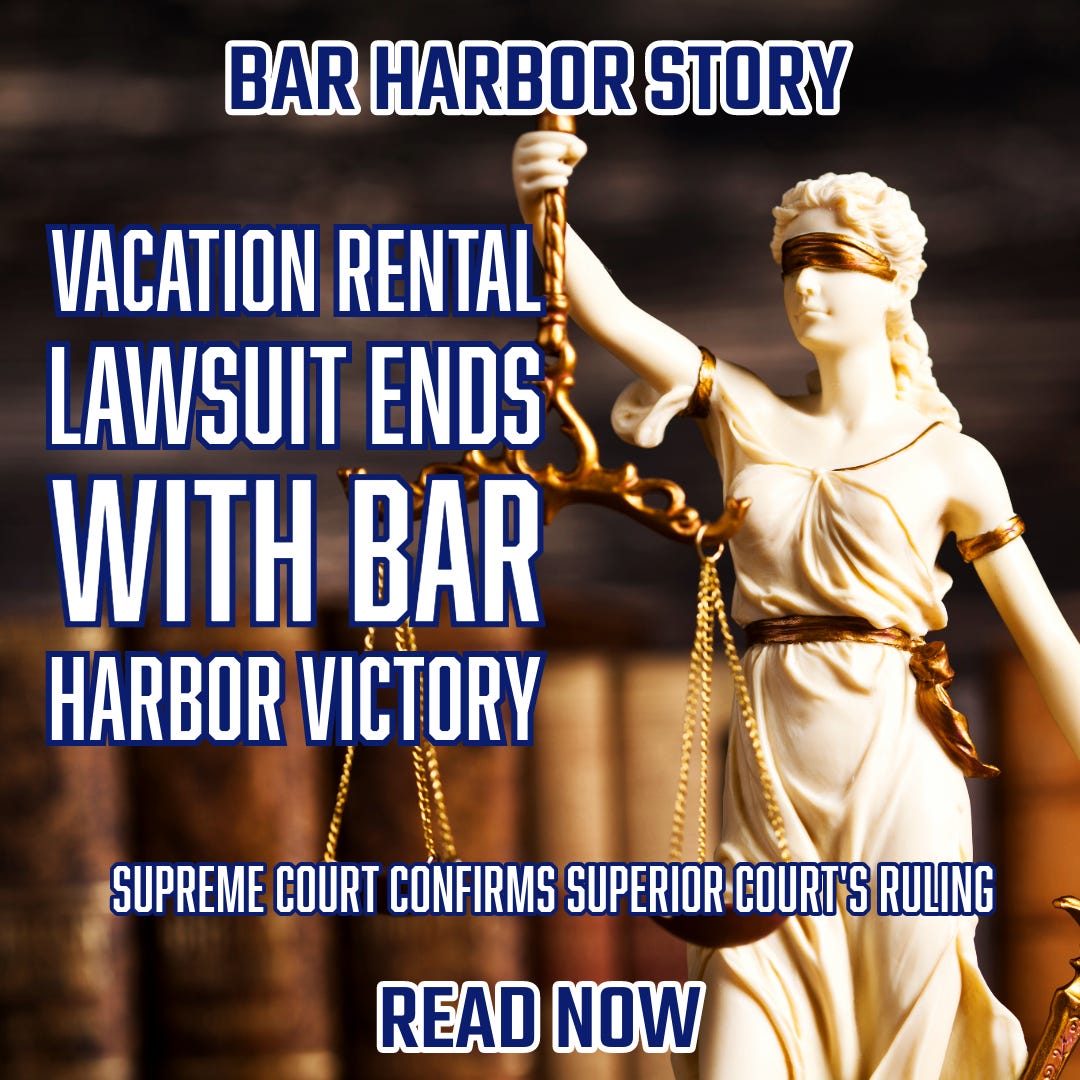Vacation Rental Lawsuit Ends With Bar Harbor Victory
Supreme Court Confirms Superior Court's Ruling
BAR HARBOR—The town of Bar Harbor’s victory in a lawsuit about a vacation rental regulation vote was upheld by the Maine Supreme Judicial Court, which agreed with Superior Court Judge Robert Murray’s April decision. Erica Brooks and Victoria Smith had appealed that decision, which was then heard in December 2023.
Brooks and Smith filed the suit in December 2021, arguing that a November 2021 vote capping vacation rentals was illegal. The vote capped short-term rentals in the town at 9%.
The Planning Board had a tie vote about the cap. Brooks and Smith argued this was a no vote. A no vote, they said, should have required a two-thirds vote for passage before the whole town. Voters have since removed that supermajority requirement.
“Because the Town’s supermajority requirement was contained only in the LUO [Land Use Ordinance], not in its charter, that requirement is unenforceable,” the court wrote.
“The ruling once again validates the town’s decision, based on legal analysis, to accept the simple majority outcome of the vote to approve the short-term rental ordinance,” Town Council Chair Val Peacock said Tuesday. “In the 2.5 years since the passage of the vote, we’ve seen the successful implementation of the ordinance, which has resulted in a reduction in the overall number of VR-2 short-term rental properties.”
The Maine Municipal Association also filed an amicus brief supporting the town. The court agreed that it did not require a super majority.
Brooks and Smith released a statement Wednesday, writing,
“This case has always been about protecting homeownership rights and a simple premise that the Town of Bar Harbor should follow its own ordinances.
“We as local constituents rely on it in order to understand how to advocate for or against local ordinances and amendments and what to expect out of the process. For many years, Bar Harbor has had an ordinance on its books that places considerable authority in the hands of the local Planning Board when it comes to land use ordinance amendments. Under this long-standing ordinance, the Planning Board is the town’s first line of authority on the advisability of changes to its land use ordinance. If the Planning Board recommends a land use change, it may be enacted following a simple majority vote of the public. But if the Planning Board does not recommend a land use change, it may only be enacted through a supermajority vote of the public. Over the years, when the Town Council was in alignment with the Planning Board, this ordinance has blocked proposed land use amendments that were disfavored by the Town Council even when such proposed amendments have had a simple majority of public support. In the one instance in which the Town Council disagreed with the Planning Board and wished to see its preferred version of local short-term rental ordinances enacted, it ignored this long-standing ordinance and adopted its proposed land use changes without achieving a supermajority vote.
“We are disappointed that the law court sidestepped this important issue regarding the Town Council’s inappropriate selective application of its own ordinance. We do not think justice is served when a municipality that has enacted and enforced an ordinance for years abandons it to suit their purposes in litigation.
“The VR ordinance and the way it is enforced has done nothing to help affordable housing here in our community and has proven to entrap and handicap property owners; in one circumstance even forced a hardworking local family to sell their business as a result. During a time when we are seeing a double digit tax increase and the housing market continue to be more expensive it is unfortunate to see an ordinance and the way it is enforced, tie the hands of tax payers by removing their rights. We firmly believe that governments shall not arbitrarily infringe on the basic right of the individual to acquire, possess, and freely transfer real property, and shall protect private property rights as referred to in the 5th and 14th Amendments of the United States Constitution.”
Disclosure: I have a short-term rental property in Bar Harbor that I used to live in and intend to move back into once all are children are off unless one of those kids ends up coming back, which she is emphatically saying she is if she can find an okay job. :) Then she says she wants to live there. She is very empathic about things.









Carrie, have you heard about this program?
https://www.wabi.tv/2024/03/25/house-sharing-app-maine-provides-alternative-high-rental-market/?outputType=amp
Yes, empathic kids want to come back, but where will they live! Having that option is great. I dislike the property owners who have multiple properties, don't live in the community and treat the area like a commodity and not a community.